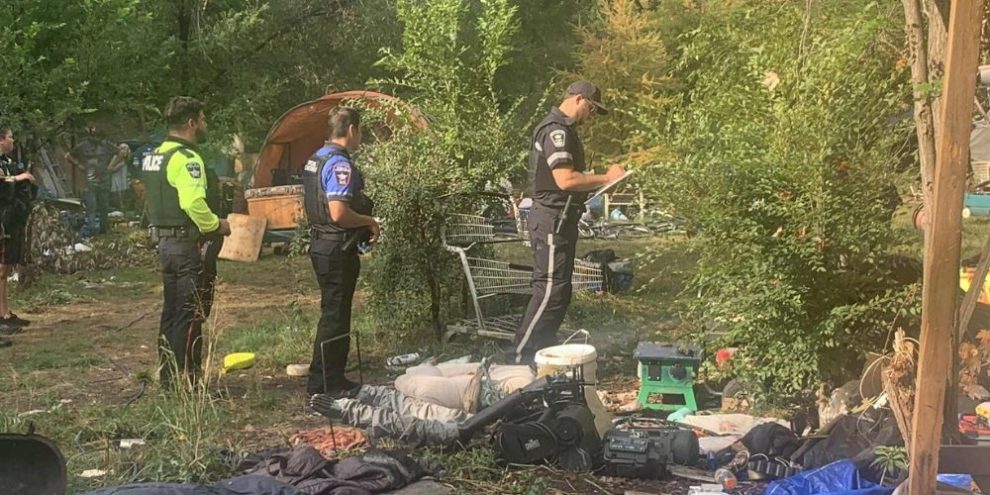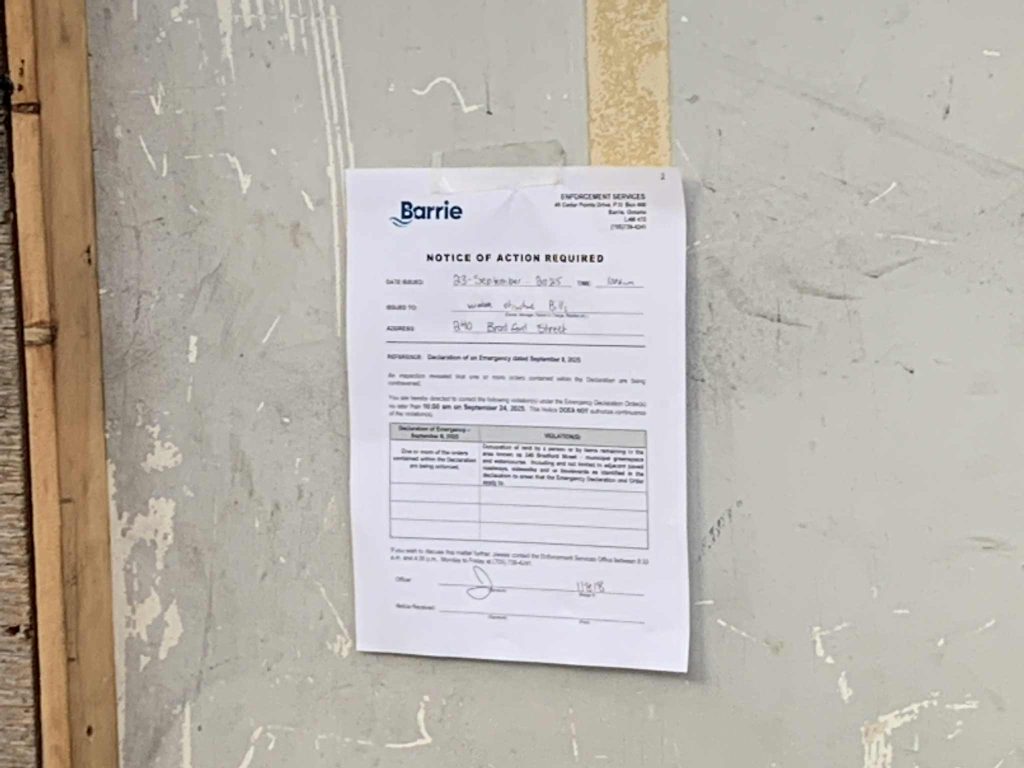
The smell of smoke wafts over a homeless encampment in the area of Bradford and Tiffin streets in Barrie on Tuesday morning.
It's minutes before city bylaw officers supported by police will arrive with notices giving residents of this encampment 24-hours to leave.
A 39-year-old man sits beside a fire he has made on the property that is dotted with at least 10 tents or wooden structures. The property is littered with what some people might call junk, while others, like several individuals here, refer to it as their treasure. The items include discarded tires, shopping carts, and a Canadian flag. There is an assortment of scattered trash, though it's hard at times to separate what's a keepsake and what's garbage. Burned debris from previous fires is evident.
Soon, several police and bylaw officers, along with special constables, enter the wooded property behind a closed business at 224-240 Bradford Street. They knock on a few wooden structures and call out to anyone who might be living in a tent. Where nobody is found, a 24-hour eviction notice is posted on the structure, while those found at the encampment are also given the same notice.

The presence of police and bylaw officers does not cause a stir among the residents. In fact, the interactions with the encampment residents are lowkey, no raised voices, and life in this environment doesn't come to a standstill.
The man next to the campfire says the encampment residents have been offered temporary shelter in hotels. He says he has heard they might be relocated from Barrie to Collingwood, Orillia, or Alliston, wherever there is shelter space. He hasn't decided if he is going to leave the encampment willingly.
He has been living at the encampment since January, after in-and-out stays at the Salvation Army downtown.
"I chose here because it's secluded," he said when asked why he is living in an encampment. "It's close to what we need. Tim Hortons is just up the road at 80 Bradford, and the Canadian Mental Health Association is just a little bit further down."
Asked if he was using the services of CMHA, he said he had been but they got backlogged.
"Personally, I can handle some of my stuff better than some people can. I can always go see a shrink or a doctor later on."
It's been two weeks since Barrie Mayor Alex Nuttall issued a state of emergency in the city in response to homeless encampments, citing public safety.
Barrie's News Delivered To Your Inbox
By submitting this form, you are consenting to receive marketing emails from: Central Ontario Broadcasting, 431 Huronia Rd, Barrie, Ontario, CA, https://www.cobroadcasting.com. You can revoke your consent to receive emails at any time by using the SafeUnsubscribe® link, found at the bottom of every email. Emails are serviced by Constant Contact
In that time, one large encampment near the courthouse on Mulcaster Street was dismantled, and on the weekend, Premier Doug Ford joined the mayor and visited an encampment at Milligan's Pond.
The premier was invited to Barrie by the mayor in an open letter in which Nuttall also asked the province to strengthen the existing system of mandatory community-based and residential mental health care, and to expand service to treat those have severe and debilitating addictions.
The mayor has also sent an open letter to Prime Minister Mark Carney, which is similar to the one given to Ford, where he listed a variety of concerns in the city he pegged back to encampments, including a double homicide, multiple fires, overdoses, assaults, open drug use, needs, and general lawlessness.
The County of Simcoe, which is responsible for shelter services, including those in Barrie, indicated on Sept. 12 that 36 individuals who had been living at the Mulcaster Street encampment had been successfully supported with accommodation options, while eight individuals declined offers for shelter spaces.
The Bradford Street encampment resident that Barrie 360 spoke with doesn't deny the use of drugs at the site, but adds that it is not rampant where he lives, and every location is different.
"We care about each other, and we always have each other's backs. No one goes hungry here. We'll all go out and get something and split it up with the camp. We work and try to give back to the community."
Asked to define what he means by work, he says odd jobs.
"I'll go on Kijiji and find some work like digging holes or cutting lawns, even roofing for a day."
Across the way, an elderly couple with a dog rummages through a few items near their tent, as police look on. This will be their second eviction from an encampment, having been removed from the one in the Anne Street area when police began an investigation into a double homicide.
"They really don't have anything," pipes up a man in his 40s, referring to the couple. He used to live in the encampment, but for the past two weeks has been sheltered at a transitional residence called Lucy's Place, a joint project between Redwood Communities and the Busby Centre.
Joshua, who was born in Alliston, had been living in British Columbia, but the prospect of a job brought him to Barrie. He says when he arrived in Barrie, the job was no longer available, and he claims to have used all of his money to return east.
"I have been homeless since, and it's not by choice by any means."
He says he was kicked out of the Salvation Army men's shelter downtown in December and made his way to the encampment.
Aware of the mayor's state of emergency, he says the double homicide in the Anne Street encampment was about a guy who thought he was judge and jury, in reference to the individual who has been charged in the slaying of two other encampment residents.
"It's not the same environment here. Everyone gets along."





